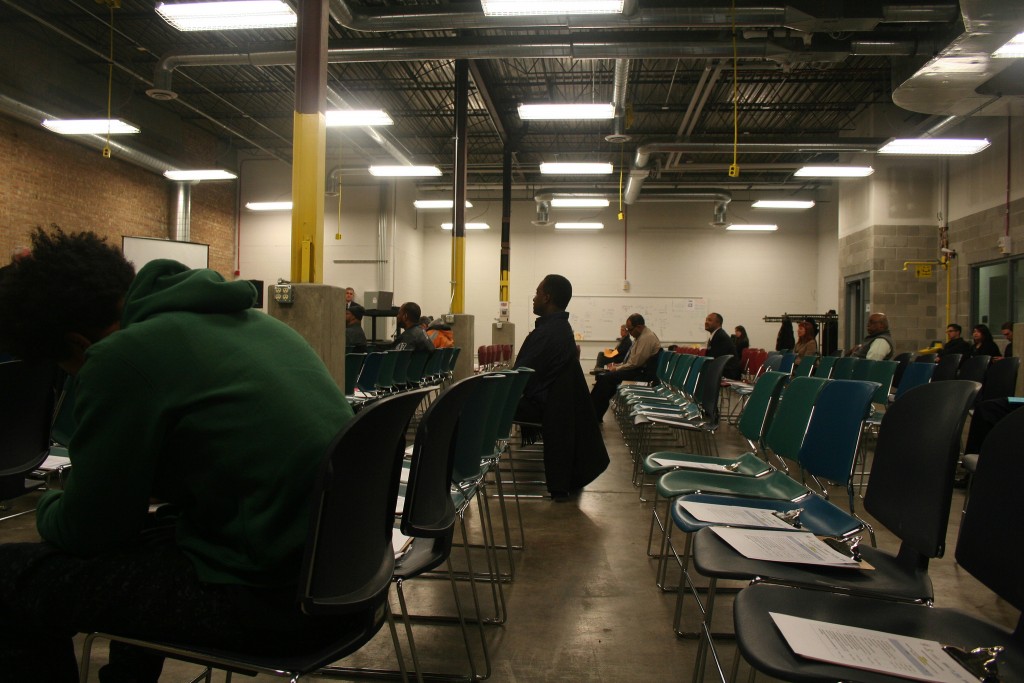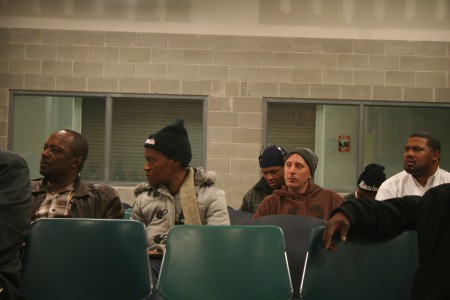Jobs Program Struggles to Find Eligible Workers
City transitional jobs program for hard-core unemployed still has half of its positions unfilled.

Empty seats litter the after-work information session, which drew less than 20 people. (Photo by Jabril Faraj)
Jared Iles, a Salvation Army Emergency Lodge resident, has been on a quest for employment since August of last year.
But all the 44-year-old ex-offender, who was convicted of a felony in 2013, has to show for his eager attitude is a stack of business cards from temp services throughout Milwaukee that have not yielded any work.
It would seem Iles has the ideal pedigree for Compete Milwaukee, a City of Milwaukee transitional jobs program, but he is childless, making him ineligible.
“There ain’t nothing I can do about it. I’m just trying to find work,” he said during a recent informational meeting about the program, where he learned he does not meet the requirements.
Iles was not alone at the information session on Feb. 11 at a MATC facility at 816 W. National Ave. More than half of the 80 job-seekers who attended did not meeting the requirements of the program which include living within a specific geographic area, caring for at least one child and having a child support order, welfare reunification plan or status as an ex-offender. Program participants must have been unemployed for at least four consecutive calendar weeks, not having worked more than 16 hours in any week since.
Prior to the Feb. 11 sessions, about 60 of the 115 positions were still available. Ernesto Baca, a contract manager at United Migrant Opportunity Services (UMOS), said information sessions last month drew about 250 people.
During the evening session, Alderman Ashanti Hamilton said that if programs like this don’t provide opportunities people can take advantage of then they can’t be considered a success.“If you relaxed those requirements, a whole lot more people would be able to qualify for the program — you would be able to allocate the resources a whole lot easier and you would have a greater impact,” he said after the session.
The program is a collaboration between the City of Milwaukee, the Wisconsin Department of Children and Families (DCF), UMOS and the Milwaukee Area Workforce Investment Board (MAWIB).

Johnny Sims (right) and others look on as local officials address the crowd of potential participants. (Photo by Jabril Faraj)
It is “focusing on individuals who live in areas where there’s high unemployment” to “create positive momentum in their lives” and act “as a springboard,” Mayor Tom Barrett said after the session.
According to DCF, the process for determining requirements starts at the federal level. However, neither Wisconsin state statutes governing the Transform Milwaukee Jobs program or Social Security Administration standards governing federal Temporary Assistance for Needy Families (TANF) funding mandate the need for a child support order, welfare reunification plan or status as an ex-offender.
“The goal was to use the allocated funds to have the most impact by targeting parents who had the highest barriers to employment,” DCF spokesman Joe Scialfa said in a statement.
The program will cost $2.1 million in 2015 and will be paid for through tax-levy financing, a Community Development Block Grant and a TANF grant.
Another program-requirement casualty is Shaniqua Stampley, a 24-year-old single mother who said she makes about $645 a month working part-time caring for her grandmother. Stampley said she works about three hours a day.
“It’s hard finding a job,” said Stampley, who attended the earlier information session. “I really thought that I had an opportunity, here … and then I started hearing the qualifications.”
Calvin Skenandore, 40, has primarily worked temporary jobs for the last 15 years. But Skenandore, who is an ex-offender, said he needs something more stable to support his girlfriend and her three children, who he views as his own. In the mean time, though, he needs the “money in his pocket.”
Leslie Silletti, a City of Milwaukee policy resource coordinator and director of Compete Milwaukee, addressed the possibility of not filling all 115 placements.
“I think we’re going to need to re-group with UMOS and [MAWIB],” she said, mentioning the potential for ongoing recruitment or another general recruitment session. But she dismissed the possibility of using different criteria.
“No, unfortunately not,” Silletti said. “We’re locked in, at least for this year.”
For those who qualified, though, the program could be the foot in the door they’ve been looking for. Johnny Sims was one of those people. The 35-year-old Sims has a child support order and has been unemployed for almost six months.
“I don’t care what [I’m] doing — I want to do it,” he said. “It’s a boost … I’m very happy.”
Program requirements
- Must reside in this geographical area at the time of enrollment: Sherman Boulevard on the West, Silver Spring Drive on the North, Hwy I-43 on the East, and Mitchell Street on the South.
- Must be 18—64 years old at the time of enrollment.
- If 24 years of age or older, MUST be the biological, adoptive or primary relative caregiver of a child under the age of 18.
- Individual must have one of the following: a child support order, a child welfare reunification plan or be an ex-offender.
- Must have been unemployed for the last four (4) consecutive calendar weeks prior to enrollment.
- Cannot be receiving W2 benefits and not eligible to receive Unemployment Insurance Compensation.
- Have an annual household income that is less than 150% of the federal poverty guideline for the household size.
This story was originally published by Milwaukee Neighborhood News Service, where you can find other stories reporting on fifteen city neighborhoods in Milwaukee.
Political Contributions Tracker
Displaying political contributions between people mentioned in this story. Learn more.
- March 24, 2016 - Tom Barrett received $100 from Leslie Silletti
- December 21, 2015 - Tom Barrett received $100 from Leslie Silletti
- December 7, 2015 - Tom Barrett received $100 from Leslie Silletti





















We are paying the case managers to try to recruit people, while the program slots go unfilled because not enough people fit the restricted target. Or if they are eligible, they have some child care problems and drop out.
Eligibility should be broadened to put people into the slots who need work. Let the case managers manage people instead of recruiting for no results.
This seems ridiculous. So if you’ve had kids (more likely than not, outside of wedlock) you’re in. But if you’ve been responsible enough not to have children that you can’t care for you’re not? If you’re an offender, you’re in. But if you’re law abiding, you’re out? So again, programs reward people who make poor choices and penalize those who don’t.
Why don’t they simply make the criteria be anyone who has been unemployed for X number of weeks and leave it at that. This way, there’s no penalty based on whether you have kids, there’s no penalty based on where you live, and no penalty based on your criminal record or lack thereof.
I want my tax dollars to help connect people to jobs. I don’t want my tax money paying people to run programs that don’t actually help people.
This article certainly leaves a puzzle: if slots are going begging while people who could use the jobs are being turned away, what are the program’s managers thinking?